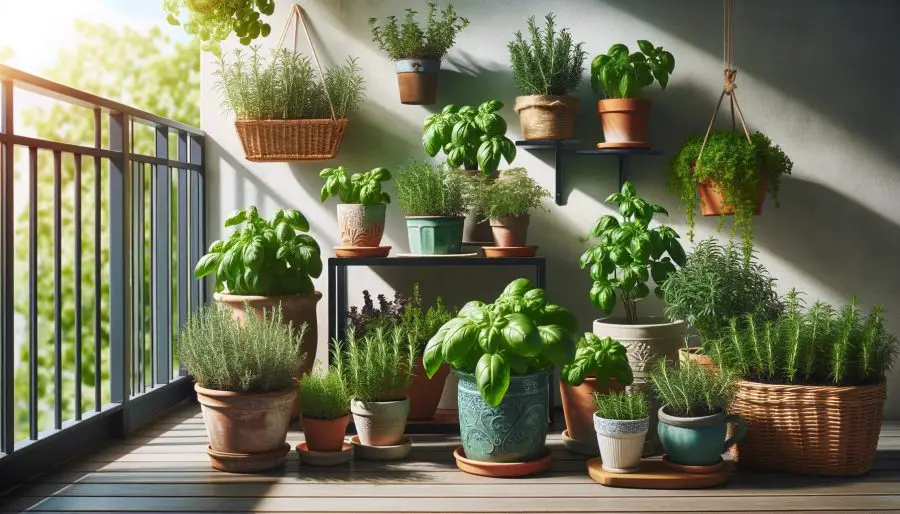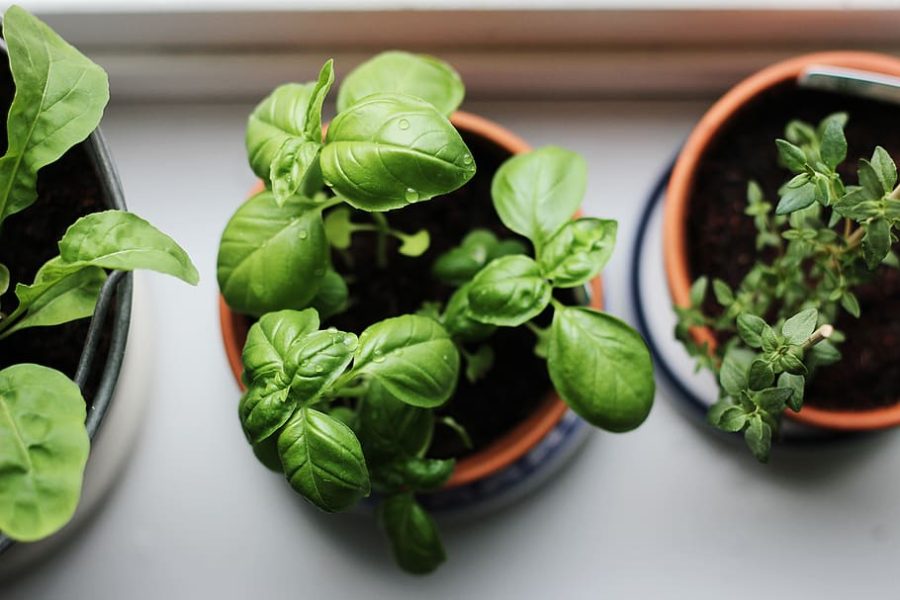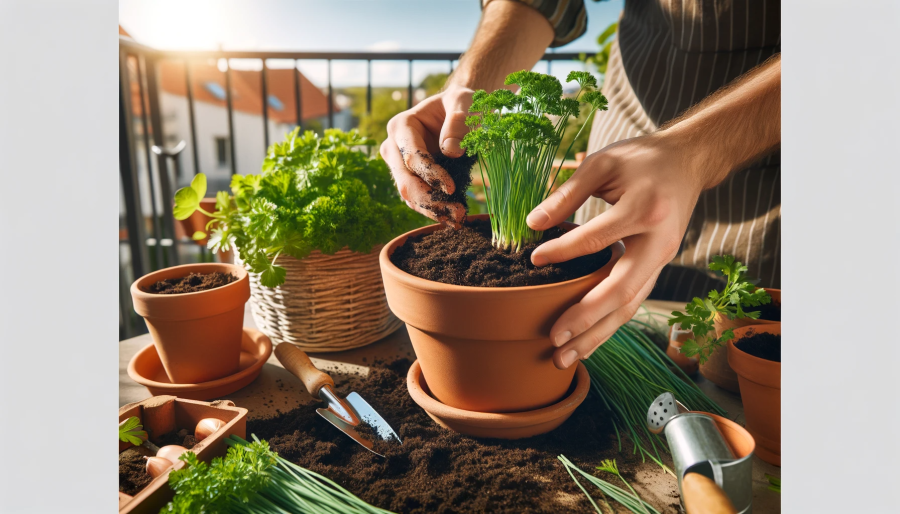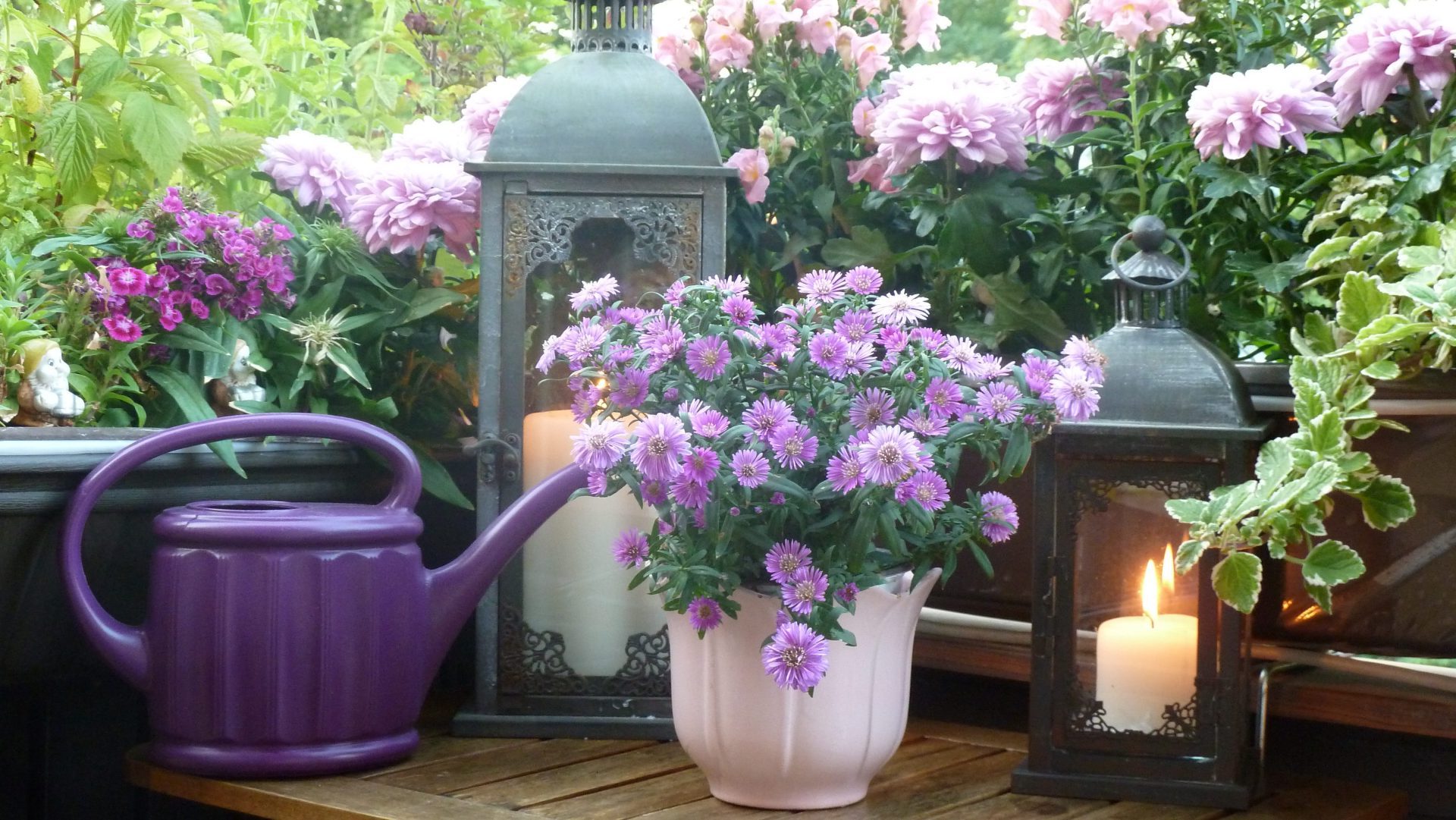We use affiliate links. If you purchase something using one of these links, we may receive compensation or commission.

Explore the simplicity and joy of container gardening for herbs, a flexible way to grow fresh, flavorful herbs in any space, large or small.
Container Gardening for Herbs
Key Takeaways:
- Container Gardening for Herbs is a practical and rewarding way to grow a variety of aromatic herbs in small spaces.
- It involves using pots or other containers to cultivate herbs, making it ideal for balconies, patios, or indoor settings.
- This method offers easy accessibility, control over soil conditions, and a fresh supply of herbs for cooking.
Dive into the world of container gardening for herbs, where you can transform even the smallest of spaces into a green sanctuary.
This guide offers essential tips and tricks to help you successfully cultivate a variety of aromatic herbs right in your home, bringing a fresh burst of flavor to your kitchen and a touch of nature to your living space.
Container Gardening for Herbs
Container gardening is a versatile and rewarding way to bring the joy of growing herbs into your own home, no matter the size of your living space.
Whether you have a spacious backyard, a compact apartment balcony, or a windowsill container gardening offers a practical solution for cultivating a variety of herbs.
From vibrant basil to fragrant rosemary, the possibilities are endless when it comes to growing herbs in containers.
In this comprehensive guide, we will explore the advantages of container gardening for herbs and highlight the best herbs to grow in containers.
We will also delve into the types of containers suitable for herb gardening and provide step-by-step instructions on how to set up and maintain a thriving container herb garden.
Whether you’re a seasoned gardener or a novice with a green thumb, this article will equip you with the essential knowledge to embark on a successful container gardening journey.
So, if you’re eager to elevate your culinary creations with freshly harvested herbs or simply want to add a touch of nature to your living space, read on to discover the wonderful world of container gardening for herbs.
Key Takeaways:
- Container gardening is a great way to grow herbs, even in small spaces.
- Growing herbs in containers has many benefits, such as easy maintenance, accessibility, and the ability to control the growing environment.
- Some of the best herbs to grow in containers include basil, rosemary, thyme, mint, and chives.
What Is Container Gardening?
.jpg)
Container gardening, particularly for herbs, involves growing various herb varieties in pots or other suitable containers instead of traditional garden beds.
This method of gardening offers numerous benefits for those who wish to cultivate herbs.
It provides flexibility as pots can be placed anywhere, be it on a balcony, patio, or windowsill, making it suitable for urban living or areas with limited outdoor space.
Another advantage of container gardening for herbs is that it allows for greater control over soil quality.
Specific soil mixes tailored for herb growth can be used, ensuring optimal growing conditions and enhancing the flavor of the herbs.
This approach makes it possible to grow a variety of herbs, even in small spaces, such as kitchen windowsills or vertical gardens.
It enables individuals to access fresh herbs conveniently for culinary and medicinal purposes.
Why Should You Grow Herbs in Containers?

Growing herbs in containers offers several advantages, especially in terms of providing the ideal conditions such as full sun exposure and well-drained soil for specific herb varieties.
Container gardening allows herbs to thrive in the optimal sunlight they require, ensuring robust growth and enhanced flavor in their leaves.
Additionally, well-drained soil in containers prevents waterlogging, which is essential for the overall health of most herb plants.
By planting different herbs in separate containers, gardeners have the flexibility to address each herb’s unique needs, from moisture levels to soil acidity, fostering their individual development and producing a diverse range of fresh, aromatic herbs.
What Are the Advantages of Container Gardening for Herbs?
Container gardening for herbs presents numerous advantages, including the ability to cultivate diverse herb varieties, ranging from Mediterranean to Italian and French types, within a limited space.
The wide range of herb varieties available for container gardening allows individuals to enjoy the culinary and ornamental benefits of these herbs with Mediterranean, Italian, and French origins.
From aromatic rosemary to savory basil and delicate thyme, each herb adds its unique flavors and scents to dishes, as well as beauty to the garden.
This diversity enhances the culinary experiences and provides an opportunity to create visually appealing combinations in small urban settings or limited outdoor spaces.
What Are the Best Herbs to Grow in Containers?
Various herbs thrive exceptionally well in container gardening, with popular choices including mint, basil, thyme, parsley, rosemary, oregano, chives, cilantro, lavender, lemon balm, marjoram, and tarragon, making them ideal for planting in pots or other suitable containers.
Herbs like mint and basil are perfect for container gardening because they don’t require much space and can thrive in relatively small pots.
Thyme, rosemary, and oregano, on the other hand, are known for their hardiness and ability to withstand hot, dry conditions, making them suitable for containers with less frequent watering.
Parsley, chives, and cilantro favor slightly moister soil, while lavender, lemon balm, marjoram, and tarragon thrive in well-drained, drier conditions, allowing for a diverse selection of container-garden-friendly herbs to suit various growing environments.
Basil
Basil is a highly favored herb for container gardening due to its adaptability to various growing conditions and its aromatic leaves, making it an excellent choice for planting in pots or other suitable containers.
One of the key features of basil that makes it suitable for container gardening is its ability to thrive in well-drained, nutrient-rich soil, which can be easily achieved in a controlled environment such as a pot or a planter.
When selecting a container for planting basil, ensure that it has adequate drainage holes to prevent waterlogging and root rot.
Additionally, basil prefers a warm and sunny location, so choose a spot with at least six to eight hours of sunlight for optimal growth.
Rosemary
Rosemary, with its fragrant and flavorful foliage, is an ideal herb for container gardening, thriving in pots or other suitable containers with well-drained soil and ample sunlight.
It is important to note that rosemary prefers a sunny environment and well-drained soil, making it a perfect candidate for container gardening.
When choosing a container, look for one with good drainage holes to prevent waterlogging, which can be detrimental to the plant’s health.
When planting rosemary, ensure that the soil is sandy and loamy, providing an ideal mix for growth.
Water the plant consistently, allowing the soil to dry out slightly between watering sessions.
This herb is a low-maintenance option for container gardens, thriving in warmer climates and tolerating drought conditions.
Not only does rosemary offer aromatic and culinary benefits, but it also serves as a beautiful ornamental plant for balconies and patios.
Its upright growth habit makes it a striking addition to any container garden or herb collection, adding a touch of elegance to outdoor spaces.
Thyme
Thyme, known for its aromatic and culinary qualities, is well-suited for container gardening, requiring well-drained soil, ample sunlight, and suitable pots or containers for optimal growth.
One of the key characteristics of thyme that makes it ideal for container gardening is its compact growth habit, making it perfect for smaller spaces.
Its hardy nature enables it to thrive with minimal maintenance, making it a great choice for novice gardeners.
In terms of its culinary uses, thyme is a staple herb in Mediterranean cuisine, adding a subtle, earthy flavor to a myriad of dishes including meats, vegetables, and sauces.
For successful growth, it’s important to choose a suitable container for thyme.
Opt for a well-draining pot or container to prevent waterlogged soil, as thyme prefers drier conditions.
Ensure the container allows for proper airflow to the roots, promoting healthy growth.
Mint
Mint, known for its vigorous growth and refreshing flavor, is an excellent choice for container gardening, thriving in pots or other suitable containers with well-drained soil and regular harvests to promote further growth.
Its versatility makes it an ideal addition to any home garden, as it can be easily incorporated into various culinary dishes and herbal teas.
When planting mint in a container, ensure the pot is at least 12 inches deep to accommodate its extensive root system and position it in a location with partial sunlight.
Regular watering is essential, keeping the soil consistently moist but not waterlogged.
Applying a balanced, water-soluble fertilizer every 4-6 weeks during the growing season will help promote healthy growth.
It’s crucial to harvest mint regularly to prevent it from becoming invasive.
Pinch off the tips of the stems to encourage bushy growth and to maintain its tantalizing flavor.
Removing any flowers that appear will also divert the plant’s energy back into leaf production.
Chives
Chives, with their mild onion flavor and vibrant appearance, are well-suited for container gardening, thriving in pots or other suitable containers with well-drained soil and consistent moisture.
Their unique flavor profile makes them a versatile addition to a wide range of dishes, from salads and soups to sauces and garnishes.
When planting chives in containers, ensure they receive at least 6 hours of sunlight daily.
It’s important to keep the soil consistently moist but not waterlogged to maintain their growth.
For optimal flavor, regular harvesting is essential, allowing the leaves to reach about 6 inches before trimming.
Container gardening also facilitates easy access to fresh chives for culinary purposes, making them a convenient and popular choice for many home gardeners.
What Types of Containers Are Suitable for Herb Gardening?
Selecting the right containers for herb gardening is essential, with options ranging from traditional clay pots and versatile plastic pots to space-saving hanging baskets and charming window boxes, each offering distinct benefits for cultivating herbs.
Clay pots are a classic choice for herb gardening, known for their natural breathability which helps regulate soil moisture levels and prevent overwatering.
Their weight provides stability, ideal for outdoor settings where winds may be a factor.
On the other hand, plastic pots are lightweight, durable, and come in various sizes and styles, making them versatile for indoor and outdoor herb cultivation.
Hanging baskets are perfect for small spaces, allowing herbs to cascade gracefully while optimizing vertical spaces.
Window boxes, particularly for kitchen windows or balcony railings, create an attractive herb garden display, adding a touch of charm to any environment.
Clay Pots
Clay pots, known for their natural breathability and timeless appeal, are popular choices for herb gardening, providing ideal conditions for planting and nurturing various herb varieties.
One of the key benefits of using clay pots for herb gardening is their porous nature, allowing air and moisture to pass through the walls, promoting a healthier root system, and preventing waterlogged soil.
This breathability helps to regulate the soil temperature, ensuring the herbs’ roots are not exposed to extremes.
When planting herbs in clay pots, it’s crucial to choose a pot size that suits the herb’s root structure, providing ample room for growth.
Clay pots are suitable for a wide range of herb varieties, including thyme, rosemary, and basil, as they mimic the natural conditions many herbs thrive in.
Plastic Pots
Plastic pots offer practical and versatile options for herb gardening, featuring lightweight and durable designs that cater to the growth needs of various herb varieties with ease.
The versatility of plastic pots is evident in their ability to adapt to different herb varieties, from small, delicate ones like basil and cilantro to larger, more robust herbs like rosemary and thyme.
Their lightweight nature makes them easy to move around and rearrange, providing convenience when tending to the herbs.
Plastic pots retain moisture well, helping to maintain the necessary hydration levels for healthy herb growth.
When planting in plastic pots, it’s important to ensure proper drainage by adding a layer of gravel or small stones at the bottom, allowing excess water to drain efficiently.
Hanging Baskets
Hanging baskets provide a charming and space-efficient solution for herb gardening, allowing for vertical cultivation of various herb varieties in well-drained soil with adequate sunlight.
One of the significant benefits of using hanging baskets for herb gardening is the ability to maximize the use of available space.
These baskets can be hung from hooks, rails, or brackets, making them ideal for small gardens, balconies, and patios.
They also offer the convenience of bringing herbs closer to the kitchen, allowing for quick access while cooking.
When planting herbs in hanging baskets, it’s essential to choose varieties that are suitable for this type of cultivation, such as trailing rosemary, thyme, oregano, and mint.
Proper watering is crucial to ensure the herbs thrive in their suspended environment.
Window Boxes
Window boxes offer a picturesque and convenient option for herb gardening, enabling the cultivation of various herb varieties close to indoor or outdoor living spaces, enhancing both visual appeal and culinary accessibility.
Not only do window boxes add a charming touch to the exterior of a home, but they also provide a practical solution for those who may have limited outdoor garden space.
The narrow design of the boxes allows herbs to be easily accessed for watering and harvesting, making them an ideal choice for culinary enthusiasts.
When planting herbs in a window box, it’s important to consider the size of the box concerning the herbs’ root systems and their sunlight requirements.
Strategic placement of herbs to optimize sunlight exposure can significantly enhance their growth and flavor.
How to Set Up a Container Herb Garden?

Establishing a thriving container herb garden involves key steps such as selecting suitable zones, sourcing quality soil, and ensuring proper drainage.
When choosing suitable zones for your container herb garden, it’s essential to consider the specific sunlight and temperature requirements of the herbs you intend to grow.
Different herbs thrive in different conditions, so it’s important to match the plants with the appropriate zones based on your location.
Quality soil is a critical component of a successful container herb garden.
Opt for a well-draining potting mix rich in organic matter, as it allows for proper root development and moisture retention while preventing waterlogged conditions.
Ensuring proper drainage for your containers is imperative to prevent waterlogging, which can lead to root rot and other issues.
Consider using pots with drainage holes or adding a layer of gravel at the bottom of the container to facilitate water drainage.
Here’s a table showcasing various herbs along with their specific sunlight, soil, and watering needs:
| Herb | Sunlight Needs | Soil Needs | Watering Needs |
|---|---|---|---|
| Basil | Full sun | Well-drained, nutrient-rich | Keep evenly moist |
| Rosemary | Full sun | Well-drained, sandy | Allow soil to dry between watering |
| Thyme | Full sun to partial shade | Well-drained, sandy | Allow soil to dry slightly between watering |
| Mint | Full sun to partial shade | Rich, moist | Keep consistently moist |
| Chives | Full sun to partial shade | Fertile, moist | Keep soil moderately moist |
| Parsley | Full sun to partial shade | Moist, well-drained | Keep evenly moist |
| Cilantro | Full sun | Rich, well-drained | Keep evenly moist |
| Oregano | Full sun | Well-drained, moderately fertile | Allow soil to dry slightly between watering |
| Sage | Full sun | Well-drained, sandy | Allow soil to dry between watering |
| Lavender | Full sun | Well-drained, slightly alkaline | Allow soil to dry out between watering |
Choosing the Right Location
Selecting the ideal location for a container herb garden involves considering the specific needs of herb varieties, such as those with Mediterranean, Italian, and French origins, to ensure optimal growth and vitality.
For Mediterranean herbs like rosemary, thyme, and oregano, a sunny and well-drained spot is crucial, replicating their native conditions.
The Italian favorites, such as basil and parsley, thrive in slightly shaded areas with well-aerated soil.
On the other hand, French herbs like lavender and sage require a sunny location with good air circulation to flourish.
Considering the climate and the location of your garden is essential.
Mediterranean herbs generally prefer warm, dry conditions, while Italian herbs thrive in temperate climates.
The French herbs, being somewhat versatile, can adapt to a broader range of climates.
Preparing the Soil
Preparing the soil for a container herb garden involves creating a well-balanced and suitable growing medium for various herb varieties, including those with Mediterranean, Italian, and French profiles.
One essential aspect of soil preparation is to ensure adequate drainage, especially for Mediterranean herbs like rosemary and thyme, which thrive in drier conditions. Some recommend adding coarse sand to the soil mix to enhance drainage while also enhancing the soil’s texture.
For Italian herbs such as basil and oregano, the soil should be rich in nutrients, so incorporating composted organic matter is crucial.
In terms of French herbs like lavender and tarragon, a slightly alkaline soil pH is ideal, achieved by adding a small amount of lime to the mix.
Coco Coir and Perlite
I prefer using a mix of coco coir and perlite for all my herb plants. You can alter the mix by adding more or less perlite. Generally, 25% perlite is a good mix for most herbs.
Coco coir offers great moisture-holding capacity, drainage, and aeration properties.
It is also an environmentally friendly and sustainable option compared to potting soil.
Planting the Herbs
Planting herbs in a container garden requires attention to specific requirements to ensure the successful cultivation of diverse herb varieties tailored to the container environment.
When planting herbs in a container garden, it is crucial to consider the individual needs of different herbs.
Pay particular attention to watering and sunlight exposure. For instance, delicate herbs like basil thrive in ample sunlight, while thyme and mint require less direct sun.
Pay attention to proper drainage in container gardens to prevent waterlogged soil, which can be detrimental to various herb species.
Watering and Fertilizing
Proper watering and fertilizing techniques are crucial for the sustained growth and vitality of herbs in container gardening.
In terms of watering herbs in containers, it’s important to strike a balance.
Herbs typically prefer well-drained soil, so overwatering can lead to root rot and other issues.
On the other hand, underwatering can cause the plants to become stressed and hinder their growth.
You can check the soil moisture level by inserting your finger into the soil up to the second knuckle and if it feels dry, it’s time to water.
Consider using a watering can with a narrow spout to direct water to the base of the plants without splashing the foliage, which can help prevent diseases.
As for fertilizing, it’s recommended to use a balanced, slow-release organic fertilizer to provide a steady supply of nutrients to the herbs.
For example, a 10-10-10 fertilizer can be a good choice, but it’s essential to follow the application instructions provided by the manufacturer.
Frequent, light feedings are often more beneficial than occasional heavy doses, especially for herbs in containers.
This approach helps prevent nutrient buildup and potential damage to the plant roots.
Maintaining and Harvesting the Herbs
The maintenance and harvesting of herbs in container gardening require attentive care and a tailored approach to ensure optimal results, particularly for herb varieties with Mediterranean, Italian, and French origins.
When cultivating herbs with Mediterranean, Italian, and French characteristics, it is essential to replicate their native growing conditions as closely as possible within the container environment.
Adequate drainage, well-draining soil, and ample sunlight are crucial for these herb varieties’ flourishing.
Mediterranean herbs, such as rosemary and thyme, thrive in dry, arid conditions, while Italian and French herbs like basil, oregano, and marjoram favor a slightly more humid climate.
The importance of monitoring moisture levels and ensuring proper air circulation to prevent fungal diseases in these herbs is important.
The use of containers with good depth facilitates healthy root development for Mediterranean, Italian, and French herbs, so selecting pots or planters with sufficient room for root expansion is advised.
It is recommended to periodically transplant or refresh the container soil to maintain nutrient levels and optimize herb growth.
Considering the herbs’ growth habits is beneficial; for instance, Mediterranean herbs tend to sprawl, requiring ample space, while Italian and French herbs can be pruned to promote bushy growth within the container.
Container Gardening for Herbs FAQs
Q. What is container gardening for herbs?
A. Container gardening for herbs is the practice of growing herbs in pots or other containers instead of in a traditional garden bed.
This is a great way to have fresh herbs easily accessible, even if you have limited space.
Q. What types of containers are suitable for container gardening?
A. Almost any type of container can be used for container gardening for herbs, as long as it has good drainage.
Some popular options include clay pots, plastic containers, and even repurposed items like tin cans or old teapots.
Q. What types of herbs are suitable for container gardening?
A. A wide variety of herbs can thrive in container gardens, including basil, chives, cilantro, oregano, parsley, rosemary, sage, thyme, and more.
It’s best to research the specific needs of each herb before planting.
Q. How should I care for my container herb garden?
A. Proper care for a container herb garden includes watering regularly, providing ample sunlight, and occasionally fertilizing.
It’s also important to regularly trim and harvest the herbs to promote healthy growth.
Q. Can I grow herbs indoors in containers?
A. Absolutely! Many herbs can be grown successfully indoors in containers. Just make sure to place them in a sunny spot and rotate them every so often to ensure they grow evenly.
Q. What benefits does container gardening for herbs offer?
A. Container gardening for herbs offers several benefits, including convenience, accessibility, and versatility.
It also allows for easy customization and can be a great option for those with limited space or mobility.
Conclusion: Container Gardening for Herbs
As we wrap up our exploration of container gardening for herbs, it’s clear that this method offers a fantastic opportunity for garden enthusiasts of all levels.
Whether you’re in a sprawling house with a backyard or a cozy apartment with a small balcony or windowsill, container gardening for herbs is a versatile and rewarding endeavor.
It allows you to grow a variety of herbs easily and accessibly, bringing fresh flavors and greenery into your daily life.
The Joy of Growing Herbs in Containers
Container gardening for herbs is not just about convenience; it’s about the joy and satisfaction of nurturing plants and watching them thrive in your care.
This method brings gardening to everyone, regardless of space constraints.
Learn more: You can also grow vegetables in containers.
A Sustainable Choice for Modern Living
Embracing container gardening for herbs aligns with sustainable living practices.
It reduces the need for store-bought herbs, minimizes waste, and encourages a closer connection with the food we consume.
Endless Possibilities for Culinary Exploration
With a variety of herbs at your fingertips, container gardening opens up endless culinary possibilities.
Fresh herbs can transform simple dishes into extraordinary meals, enhancing flavors and adding nutritional value.
A Step Towards Green Living
By engaging in container gardening, you contribute to a greener, more sustainable world.
It’s a small step with a significant impact, fostering a deeper appreciation for nature and its cycles.
Final Thoughts
Container gardening for herbs is a simple, enjoyable, and rewarding pursuit.
It brings nature closer, enhances your cooking, and contributes to a sustainable lifestyle.
Regardless of your living situation, incorporating a container herb garden is a small change that can make a big difference in your daily life.















